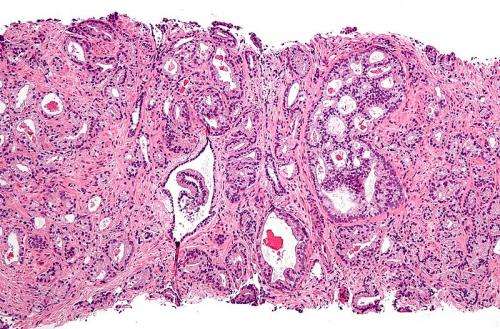Protein that hinders advancement of prostate cancer identified

Researchers at Boston University School of Medicine (BUSM) have discovered that blocking a specific protein, may be a promising strategy to prevent the spread of castration-resistant prostate cancer (CRPC).
Under the direction of BUSM's Gerald V. Denis Ph.D., researchers have long studied a family of three closely related proteins, called BET bromodomain proteins, composed of BRD2, BRD3 and BRD4, which regulate gene expression. BUSM researchers were the first (in the 1990s) to show how these proteins function in human cancer.
These researchers now have discovered that inhibition of the protein BRD4, but not BRD2 or BRD3, consistently regulated prostate cancer cell migration and invasion.
CRPC is a highly aggressive form of prostate cancer that often leads to the development of lethal metastases. Standard of care treatment for patients with CRPC typically includes a means to disrupt androgen receptor (AR) signaling, and while effective for an average of two-three years, treatment inevitably fails to impede progression due to acquired resistance mechanisms to the AR.
"Our findings are significant because current therapeutic options for CRPC are limited and focus primarily on suppressing prostate tumor cells that rely on AR signaling," explained first author Jordan Shafran, a Ph.D. candidate in the department of molecular and translational medicine at BUSM.
CRPC is a complex, heterogenous disease, with varying AR states and expression patterns across individual tumor cells. As the disease progresses, prostate tumor cells can become less reliant on AR signaling and use alternative signaling mechanisms to sustain growth and dissemination. "Therefore, it is imperative to identify 'druggable' targets that regulate prostate cancer cell migration and invasion in cells that are either reliant on, or independent of, androgen receptor signaling," he added.
These findings appear online in the journal Molecular Cancer Research.
More information: BRD4 regulates metastatic potential of castration-resistant prostate cancer through AHNAK, Molecular Cancer Research (2019). DOI: 10.1158/1541-7786.MCR-18-1279














